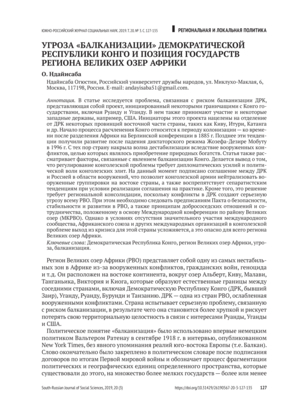Abstract
The article examines the problem resulting from the risk of the DRC’s Balkanization — a project initiated by some of the Congo’s neighboring states, including Rwanda and Uganda. Besides, some Western powers (the USA among them) participate in the project whose initiators aim at separating some provinces in the eastern part of the country, such as Kivu, Ituri, Katanga, etc. The beginning of the fragmentation dates back to colonization period, i. e. to after the Berlin Conference of 1885 at which Africa was divided. Later, this process gathered force after the fall of Joseph-Desiree Mobutu’s dictatorship in 1996. Since then, the country has experienced interminable waves of destabilization due to numerous armed conflicts aimed at capturing natural resources. The paper also analyzes some factors covering the Congo’s Balkanization phenomenon. It is concluded that the resolution of the problem requires diplomatic efforts and the political will of the Congolese elites. So far, an agreement in the sphere of armaments has been signed between the DRC and the RF; provided this agreement is implemented, it will enable the Congolese army to neutralize armed groups in the east and will discourage secessionist tendencies. In addition, this approach requires regional consolidation, as conflicts in the DRC pose a serious threat to the entire RGLA. At the same time, the covenants on peace, security and development in the RGLA, as well as the principle of good neighborly relations and cooperation on which the International Conference on the Great Lakes Region (ICGLR) is based, should be respected.
Keywords
References
- Balkanisation de la RDC: la position officielle du gouvernement des Etats-Unis. Le Potentiel. 22.09.2011.
- Frédéric B. B. La tentative de balkanisation de la République Démocratique du Congo: Un révisionnisme dangereux pour l’Afrique du principe de l’uti possidetis juris. Retrieved from http://www.mokengeli.com/information-politique/balkanisation-de-la-republique-democratique-du-congo-un-revisionisme-dangeureux-pour-l-afrique/#page-top.
- Guy de Boesk, Balkanisation de la RDC. Retrieved from http://www.congoforum.be/upldocs/La%20balkanisation%20de%20la%20RDC.pdf.
- Jackson, R. H. (1993). Quasi-states: Sovereignty, International Relations and the Third World. Cambridge University Press.
- Ka Mana, Président de Pôle Institute. Les guerres du Kivu et leurs significations politiques pour la société congolaise et la construction de l’Etat. CongoForum. Retrieved from http://www.congoforum.be/fr/ analysedetail.asp?id=194546: 21.07. 2013).
- Kollinz, R. (2005). Balkanizatsiia ili Amerikanizatsiia geopoliticheskaia teoriia etnicheskikh izmenenii [“Balkanization” or “Americanization”: A Geopolitical Theory of Ethnic Change]. Logos [Logos], 1, 19–64.
- Mbanza Malale, G. Les aspects juridiques dans les enjeux des crises congolaises, Thèse de doctorat, Faculté de Droit, Unikin.
- Mbaya M. Réflexions Sur Le Projet De Balkanisation De La RDC — Géoéconomique Et Géopolitique. Retrieved from https://www.lecongolais.cd/reflexions-sur-le-projet-de-balkanisation-de-la-rdc-geoeconomique-et-geopolitique.
- Melmoth, S. (2007). République démocratique du Congo: décentralisation et sortie de conflit. Afrique contemporaine, 1, 75–85.
- Minyazhetdinov, I. Kh. (2015). Balkanizatsiia Iraka faktory vosproizvodstva i rasprostraneniia politicheskogo nasiliia [The Balkanization of Iraq: Factors of the Reproduction and Spread of Violence]. In V. Naumkin, D. Maly`sheva Konflikty i voiny XXI veka Blizhnii Vostok i Severnaia Afrika [Conflicts and Wars in the XXI century (Middle East and North Africa)]. M.: In-t Vostokovedeniia RAN.
- Nekhamkin, V. A. (2013). Balkanizatsiia kak sotsialnyi protsess proshloe i budushchee [Balkanization as a Social Phenomenon: The Past and Future]. Sotsium i vlast’ [Society and Power], 1(39), 40–44.
- Plan des patriots kabilistes de Mzée “PK”pour sortir de la crise dans la Région de Grand Lac et particulièrement de la République Démocratique du Congo. Le Parti politique”Patriotes Kabilistes de Mzée”. Fait à Lubumbashi, le 10 Novembre 2012. P. 1.
- Résolution 1514 (XV) de l’Assemblée générale de l’ONU, Déclaration sur l’octroi de l’indépendance aux pays et aux peuples coloniaux. Retrieved from http://www.un.org/fr/decolonization/declaration.shtml
- Sidorova, G. M. (2014). Kto vinovat v nestabil’nosti Demokraticheskoy respubliki Kongo? [Who is Responsible for Instability in the Democratic Republic of Congo?]. Vestnik MGIMO Universiteta [MGIMO Review of International Relations], 6(39), 29–36.
- Sidorova, G. M. (2013). Vooruzhennyye konflikty v Afrike na primere Demokraticheskoi Respubliki Kongo [Armed Conflicts in Africa (the Democratic Republic of Congo Study)]. M.: Institut Afriki RAN.
- Sidorova, G. M. (2014). Who is Responsible for Instability in the Democratic Republic of Congo? MGIMO Review of International Relations, 6(39), 29–36.
- Sovet Bezopasnosti OON. Pis’mo Predsedatelya Komiteta Soveta Bezopasnosti, uchrezhdennogo rezolyutsiyey 1533 (2004) po Demokraticheskoy Respublike Kongo, ot 26 iyunya 2012 goda na imya Predsedatelya Soveta Bezopasnosti [UN Security Council. The Letter of Chairman of the Committee on the DRC Established by Resolution 1533 (2004) of June 26, 2012 Addressed to Chairman of the UN Security Council]. Retrieved from http://www.un.org/ga/search/view_doc.asp?symbol=S/2012/348/Add.1&Lang=R
- Willy, A. L. La coopération militaire avec la Russie va permettre à la RDC de mettre fin à l’embargo sur les armements (Crispin Atama). Retrieved from https://actualite.cd/2018/06/14/la-cooperation-militaire-avec-la-russie-va-permettre-a-la-rdc-de-mettre-fin-a-lembargo-sur-les-armements-crispin-atama/
 Русский
Русский

